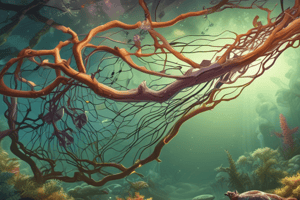Podcast
Questions and Answers
What is the scientific study of life and living organisms?
What is the scientific study of life and living organisms?
Biology
What is the branch of biology that studies the interactions between organisms and their environment?
What is the branch of biology that studies the interactions between organisms and their environment?
Ecology
What is the basic unit of life?
What is the basic unit of life?
Cell
What carries genetic information in an organism?
What carries genetic information in an organism?
What are the segments of DNA that code for specific traits?
What are the segments of DNA that code for specific traits?
What is the study of evolutionary processes and the history of life on Earth?
What is the study of evolutionary processes and the history of life on Earth?
Flashcards are hidden until you start studying
Study Notes
Definition and Scope
- Biology is the scientific study of life and living organisms, including their structure, function, growth, evolution, distribution, and taxonomy.
Branches of Biology
- Botany: study of plants
- Zoology: study of animals
- Microbiology: study of microorganisms
- Ecology: study of interactions between organisms and their environment
- Biochemistry: study of chemical processes in living organisms
- Molecular Biology: study of biological molecules and their interactions
- Genetics: study of heredity and variation
- Evolutionary Biology: study of evolutionary processes and history of life on Earth
Cell Biology
- Cell: basic unit of life, made up of cell membrane, cytoplasm, and genetic material
- Cellular organelles: mitochondria, endoplasmic reticulum, ribosomes, lysosomes, etc.
- Cellular processes: metabolism, photosynthesis, cell division, cell signaling, etc.
Genetics
- DNA (Deoxyribonucleic acid): genetic material that carries genetic information
- Genes: segments of DNA that code for specific traits
- Traits: characteristics of an organism determined by genes and environment
- Inheritance patterns: dominant, recessive, codominant, polygenic, etc.
Evolution
- Theory of Evolution: explains diversity of life on Earth through natural selection, genetic drift, mutation, and gene flow
- Mechanisms of Evolution: mutation, gene flow, genetic drift, natural selection
- Evidence for Evolution: fossil record, comparative anatomy, molecular biology, biogeography
Ecology
- Ecosystem: community of organisms and their environment
- Energy flow: producers, consumers, decomposers
- Nutrient cycles: water, carbon, nitrogen, etc.
- Population dynamics: growth, decline, regulation, and interactions between populations
Definition and Scope
- Biology is the scientific study of life and living organisms, covering their structure, function, growth, evolution, distribution, and taxonomy.
Branches of Biology
- Botany is the study of plants.
- Zoology is the study of animals.
- Microbiology is the study of microorganisms.
- Ecology is the study of interactions between organisms and their environment.
- Biochemistry is the study of chemical processes in living organisms.
- Molecular Biology is the study of biological molecules and their interactions.
- Genetics is the study of heredity and variation.
- Evolutionary Biology is the study of evolutionary processes and the history of life on Earth.
Cell Biology
- The cell is the basic unit of life, composed of a cell membrane, cytoplasm, and genetic material.
- Cellular organelles include mitochondria, endoplasmic reticulum, ribosomes, lysosomes, and others.
- Cellular processes include metabolism, photosynthesis, cell division, cell signaling, and more.
Genetics
- DNA (Deoxyribonucleic acid) is the genetic material that carries genetic information.
- Genes are segments of DNA that code for specific traits.
- Traits are characteristics of an organism determined by genes and environment.
- Inheritance patterns include dominant, recessive, codominant, and polygenic.
Evolution
- The Theory of Evolution explains the diversity of life on Earth through natural selection, genetic drift, mutation, and gene flow.
- Mechanisms of Evolution include mutation, gene flow, genetic drift, and natural selection.
- Evidence for Evolution comes from the fossil record, comparative anatomy, molecular biology, and biogeography.
Ecology
- An ecosystem is a community of organisms and their environment.
- Energy flow occurs through producers, consumers, and decomposers.
- Nutrient cycles include water, carbon, nitrogen, and others.
- Population dynamics involve growth, decline, regulation, and interactions between populations.
Studying That Suits You
Use AI to generate personalized quizzes and flashcards to suit your learning preferences.




